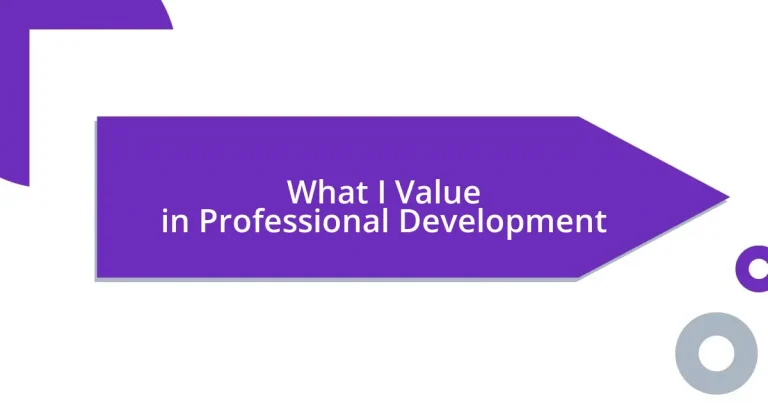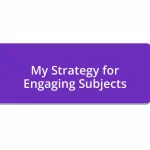Key takeaways:
- Integrity, collaboration, and adaptability are crucial values in professional development, guiding career choices and fostering a fulfilling path.
- Identifying personal growth goals involves assessing current skills, setting SMART goals, and visualizing future aspirations to create a meaningful journey.
- Skill acquisition enhances career opportunities and confidence; actively seeking feedback is vital for improvement and can lead to significant professional breakthroughs.
- Building a professional network provides support and collaboration opportunities, enriching both personal and emotional aspects of one’s career journey.
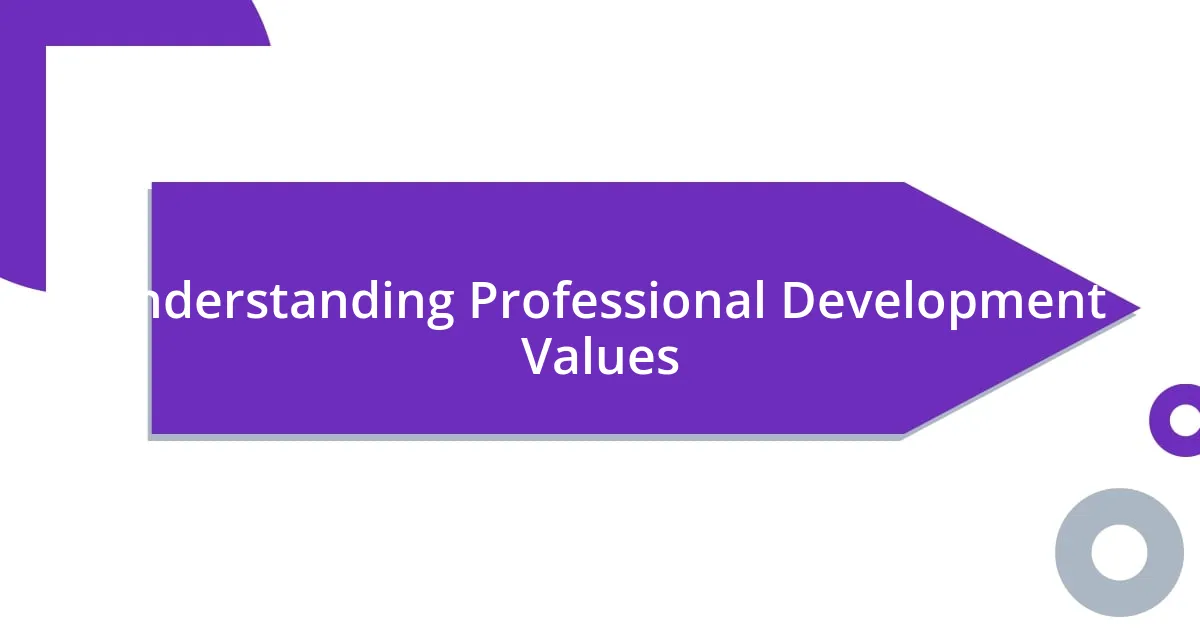
Understanding Professional Development Values
Understanding professional development values requires introspection and clarity about what truly matters to each individual. For me, integrity stands out as a guiding principle in this journey. I often reflect on experiences where my ethical compass directed my choices, like when I chose to decline a promotion that conflicted with my core values. Have you ever faced a similar crossroads?
Additionally, the importance of collaboration in professional development cannot be overstated. I’ve found that sharing knowledge with colleagues not only broadens my perspective but also deepens my connections in the workplace. I still remember a project that thrived because we shared our diverse expertise; it felt invigorating and reminded me how collective growth amplifies individual success. How often do you engage with peers to strengthen your learning?
Finally, adaptability emerges as a vital value. In my early career, I struggled with change, often feeling overwhelmed. However, I’ve learned that embracing flexibility leads to growth opportunities I never anticipated. When was the last time you stepped outside your comfort zone? Recognizing these values in professional development has profoundly shaped my career trajectory, leading me to a more fulfilling path.
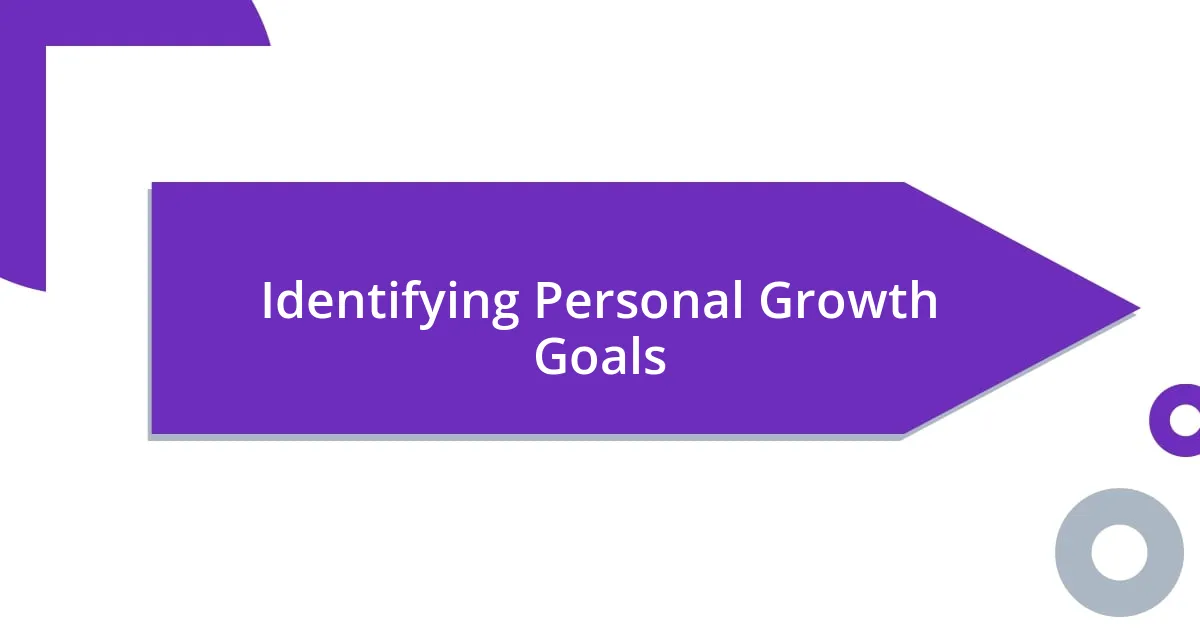
Identifying Personal Growth Goals
Identifying personal growth goals starts with a deep understanding of where you currently stand and where you desire to go. I remember sitting down one evening, reflecting on my career journey and realizing I needed to enhance my leadership skills to move forward. It was revealing, almost like peeling back layers of an onion. Defining specific, actionable goals has since become crucial, like knowing which path to take in a forest.
Here are some elements to consider when identifying your personal growth goals:
– Assess Your Current Skills: Evaluate where you excel and where you struggle.
– Reflect on Your Values: Align your goals with what truly matters to you, ensuring they resonate deeply.
– Set SMART Goals: Make sure your goals are Specific, Measurable, Achievable, Relevant, and Time-bound.
– Seek Feedback: Talk to colleagues or mentors for insights about your strengths and areas for improvement.
– Visualize Your Future Self: Picture where you want to be in the next few years—this can provide motivation and clarity.
By engaging in this introspective process, I’ve found it easier to articulate what I want to achieve, making my professional development journey not just a task but a meaningful endeavor. What about you? Have you thought about the steps you need to take to reach your own aspirations?
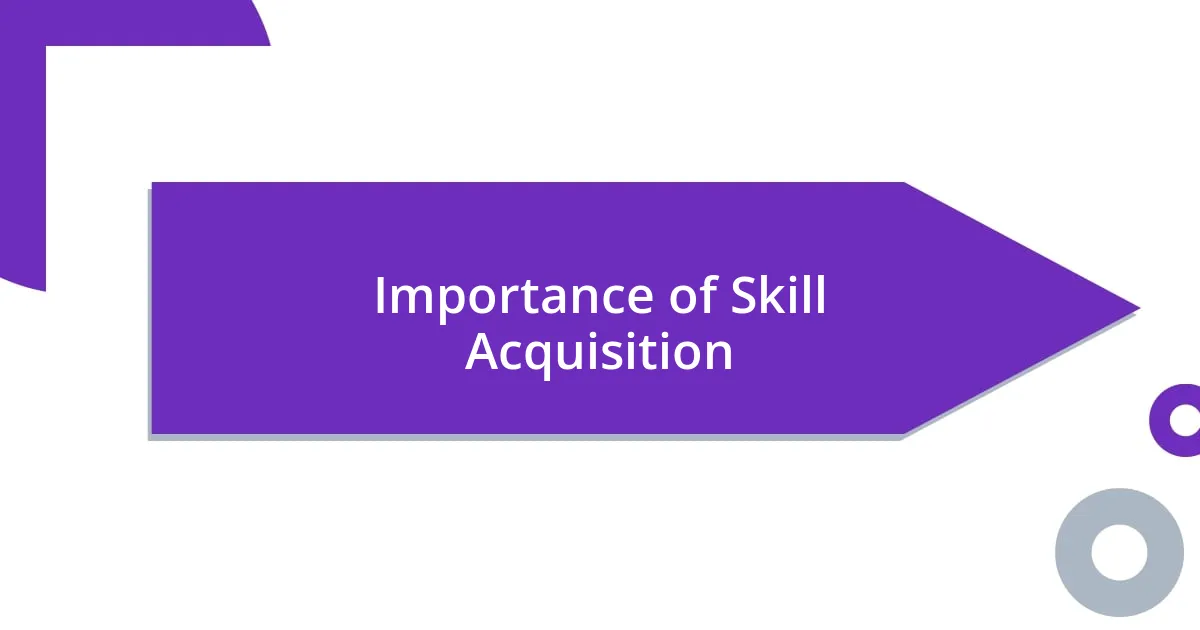
Importance of Skill Acquisition
Skill acquisition is fundamental to professional growth. I’ve often seen how learning new skills can transform a career path. For instance, integrating technology into my daily work really enhanced my efficiency—and it was satisfying to see tangible results. Have you experienced a moment where a specific skill opened new doors for you?
When we actively seek to acquire new skills, we not only boost our expertise but also increase our adaptability in the fast-changing workplace. I clearly remember when I took an online course in data analytics. At first, I was unsure if it would be relevant, but it turned out to be game-changing. I found myself applying those analytics to make data-driven decisions in my projects, and it profoundly increased my value within my team. How has skill acquisition impacted your decisions or roles in the workplace?
Moreover, the process of learning can be incredibly fulfilling. For a long time, I believed that advanced public speaking was outside my comfort zone. Yet, after joining a local Toastmasters club, I not only enhanced my communication skills but also gained confidence I never knew I had. That experience taught me that stepping into the unknown often leads to personal breakthroughs. Do you agree that the journey of acquiring skills can lead to newfound confidence?
| Aspect | Importance |
|---|---|
| Career Advancement | Enhances opportunities for promotions and new roles. |
| Adaptability | Equips individuals to handle changes in their work environment. |
| Confidence | Builds self-assurance through mastering new capabilities. |
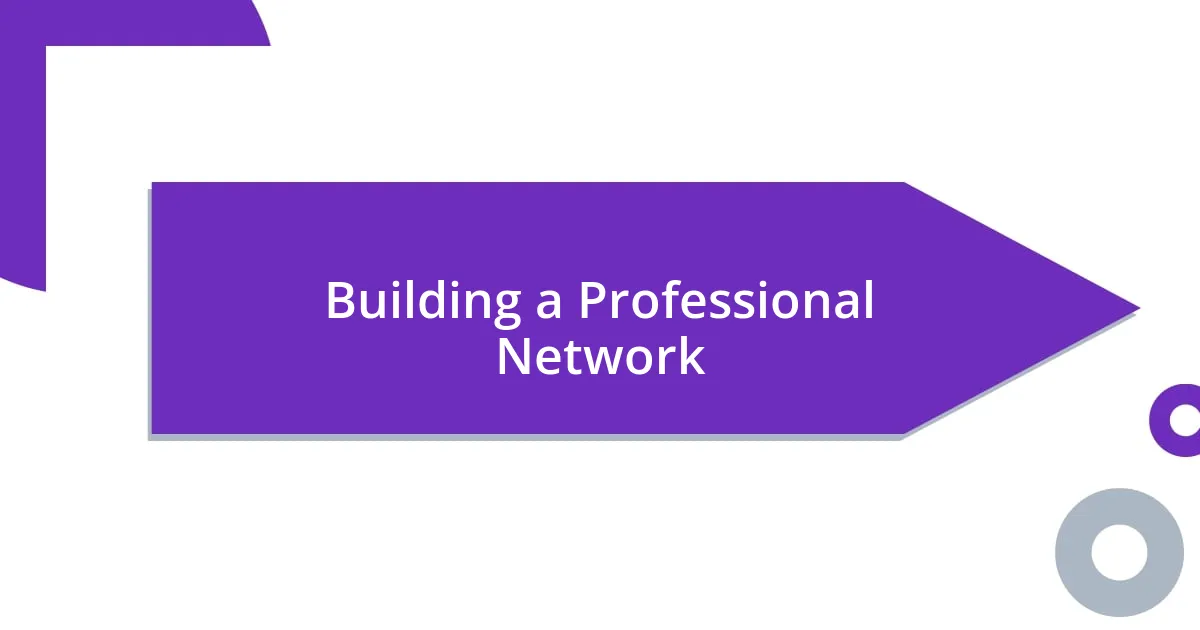
Building a Professional Network
Building a strong professional network has dramatically shifted my career perspective. I recall attending my first industry conference, feeling a mix of excitement and apprehension. Striking up conversations with strangers turned out to be incredibly rewarding; I learned that everyone has a unique story to tell, and many are open to sharing insights or even mentorship if you ask. Have you ever felt hesitant to introduce yourself? I can assure you, it can lead to meaningful connections that might just pave the way for future collaborations.
One key lesson I’ve learned about networking is the importance of nurturing relationships. It’s not always about the number of contacts you have, but the depth of those connections. I remember reaching out to a colleague I hadn’t spoken to in months, sharing my latest project. That simple conversation reignited our professional bond, leading to collaborative efforts that were mutually beneficial. When was the last time you reached out to someone in your network? Sometimes, that small gesture can lead to big opportunities.
Moreover, being part of a professional community can act as an invaluable support system. During a challenging period in my career, I turned to my network for advice and encouragement. This group not only provided insights but also shared similar experiences, making me realize I wasn’t alone in my struggles. Isn’t it reassuring to know that others have faced similar challenges? The emotional support coupled with practical advice really helped me navigate through tough times, emphasizing that building a professional network can be about more than just career advancement; it’s also about cultivating a sense of belonging in your professional journey.
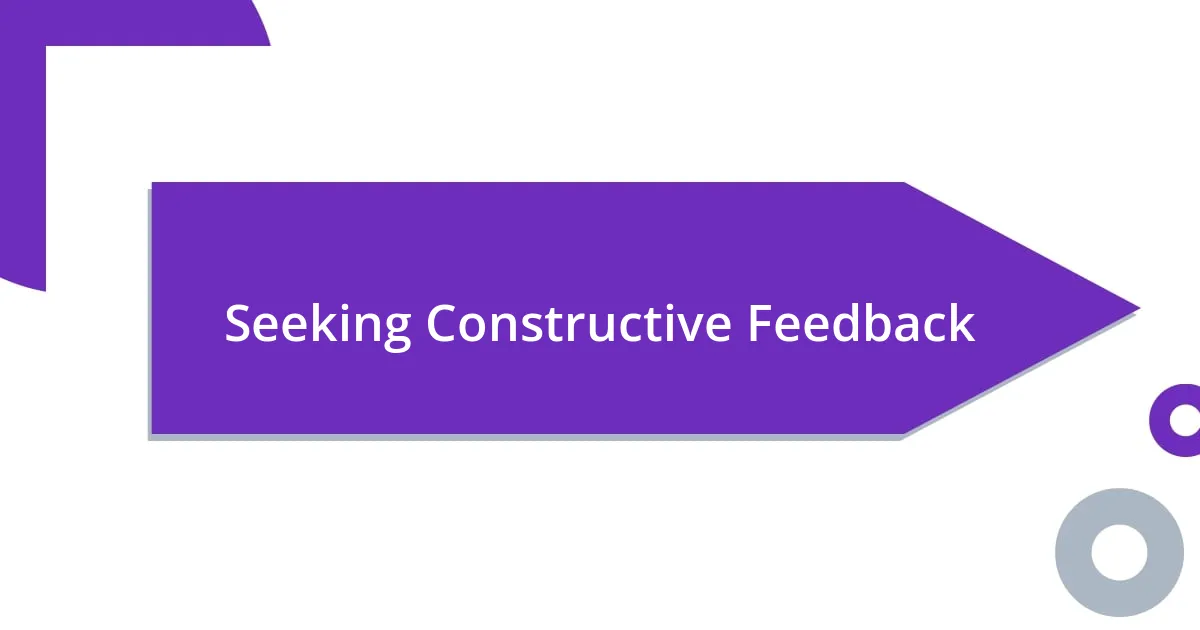
Seeking Constructive Feedback
Seeking constructive feedback has been a crucial aspect of my professional growth. I often remember one specific moment when a mentor candidly pointed out that my presentations were too data-heavy. Initially, I felt a twinge of defensiveness, but I soon realized their intention was to help me engage my audience better. Isn’t it interesting how sometimes the hardest truths can lead to the most profound improvements?
I make it a point to actively seek feedback after every project. There was a time when I was hesitant to do so, believing I could polish my work alone. However, inviting colleagues to share their insights opened my eyes to different perspectives that I might have overlooked. Has a fresh perspective from a peer ever reshaped your view on a project?
Moreover, I’ve learned that not all feedback feels good; some can sting a little. One time, I had a client who bluntly told me that my proposal lacked clarity. It was tough to swallow at first, but that moment pushed me to refine my communication skills and focus on clarity. I’ve come to appreciate these moments now, recognizing that every piece of feedback is an opportunity for growth. Have you ever experienced feedback that felt like a setback, only to realize later it was a springboard for your professional development?
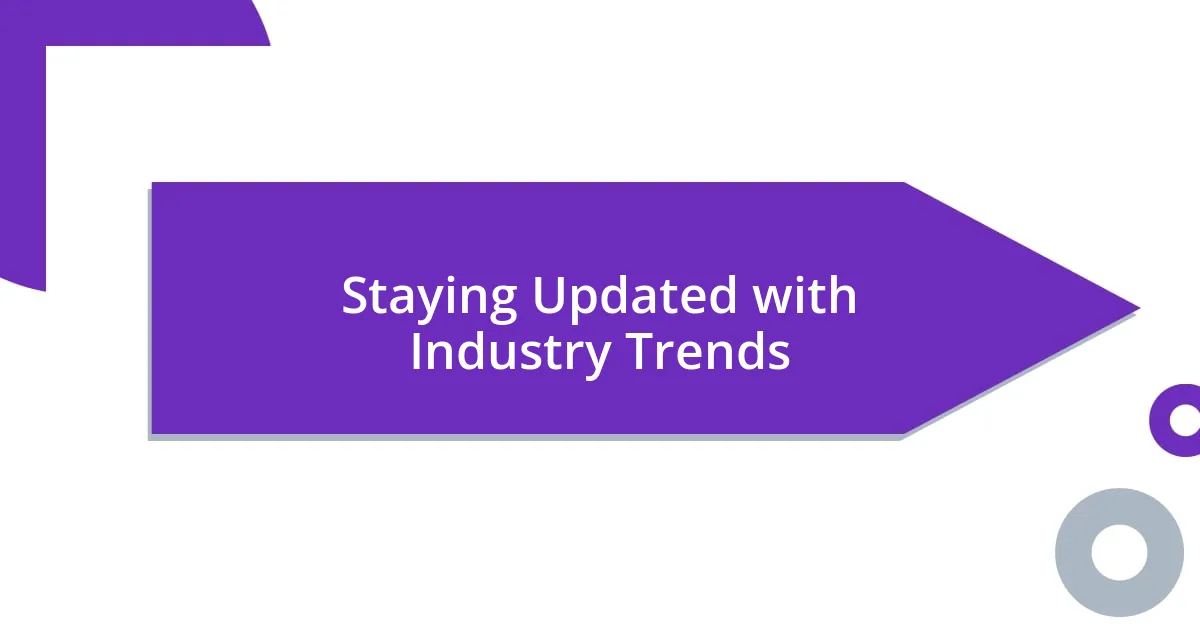
Staying Updated with Industry Trends
Staying informed about industry trends is essential in my professional journey. I recall the excitement of attending webinars where experts unravel the latest advancements. Those sessions are not just about information; they spark ideas and inspire me to think creatively. Have you ever walked away from a session feeling like you could change the world? That’s the magic of staying updated.
I find that subscribing to industry newsletters has become a staple in my routine. One particular newsletter I follow introduced me to a cutting-edge technology that ultimately transformed the way I approach my projects. It’s fascinating how a single article can reshape your perspective, isn’t it? Keeping a pulse on such developments empowers me to stay relevant and proactive in my work.
Engaging with social media platforms also plays a significant role in my quest for knowledge. I often scroll through LinkedIn to see what thought leaders are discussing. I once discovered a trending topic that led me to initiate a successful project in my company. It’s incredible how quickly information spreads, providing endless opportunities for innovation. How do you stay connected to the trends shaping your field? For me, it’s about creating a habit of curiosity that translates into action.
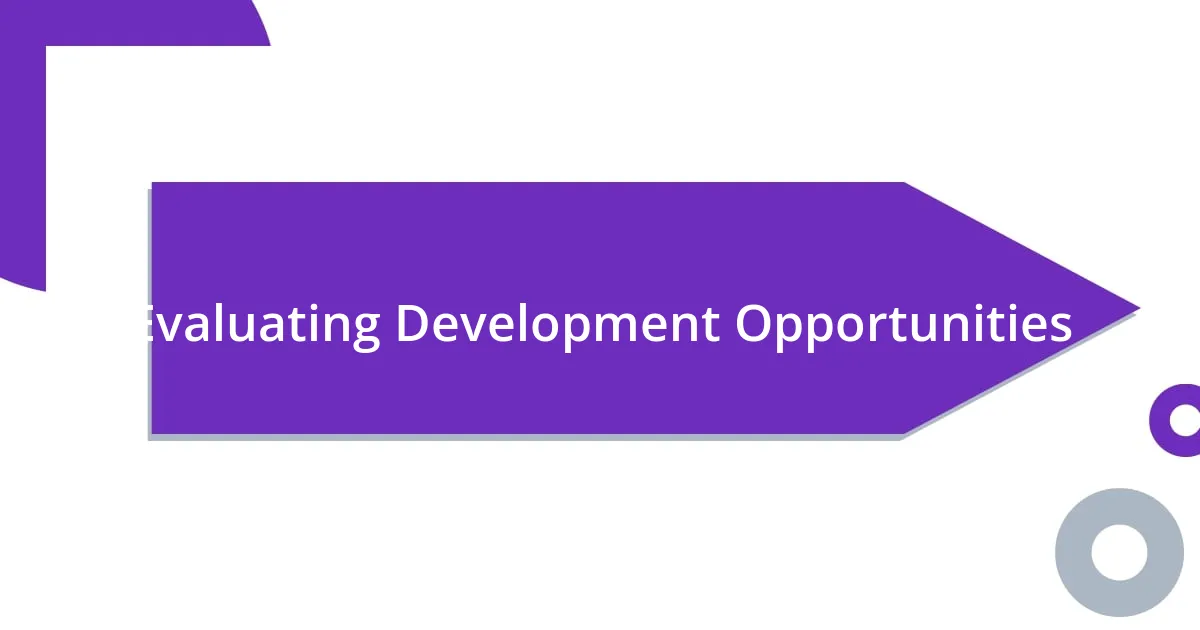
Evaluating Development Opportunities
Evaluating development opportunities is something I take seriously. When considering a workshop or training program, I always ask myself if it aligns with my long-term career goals. For instance, there was a time I enrolled in a course that initially seemed tempting but didn’t mesh with my aspirations. Reflecting back, I realized that determining relevance before commitment saved me both time and resources.
I also think about the potential return on investment. A few years ago, I chose to participate in a leadership seminar, and it profoundly shaped my approach to team dynamics. The breakthrough came when I witnessed significant improvements in my team’s collaboration after implementing what I learned. Have you ever made an investment in your growth and felt that excitement wash over you when you could see its value in action?
Moreover, I appreciate the importance of the trainer’s expertise and background. I once attended a session led by an industry pioneer. Their stories and insights redefined my understanding of professional development. It’s not just the content that matters, but the experience behind the words. Isn’t it amazing how a single expert perspective can create a ripple effect in our own understanding? Evaluating these elements allows me to choose opportunities that genuinely enrich my career journey.












